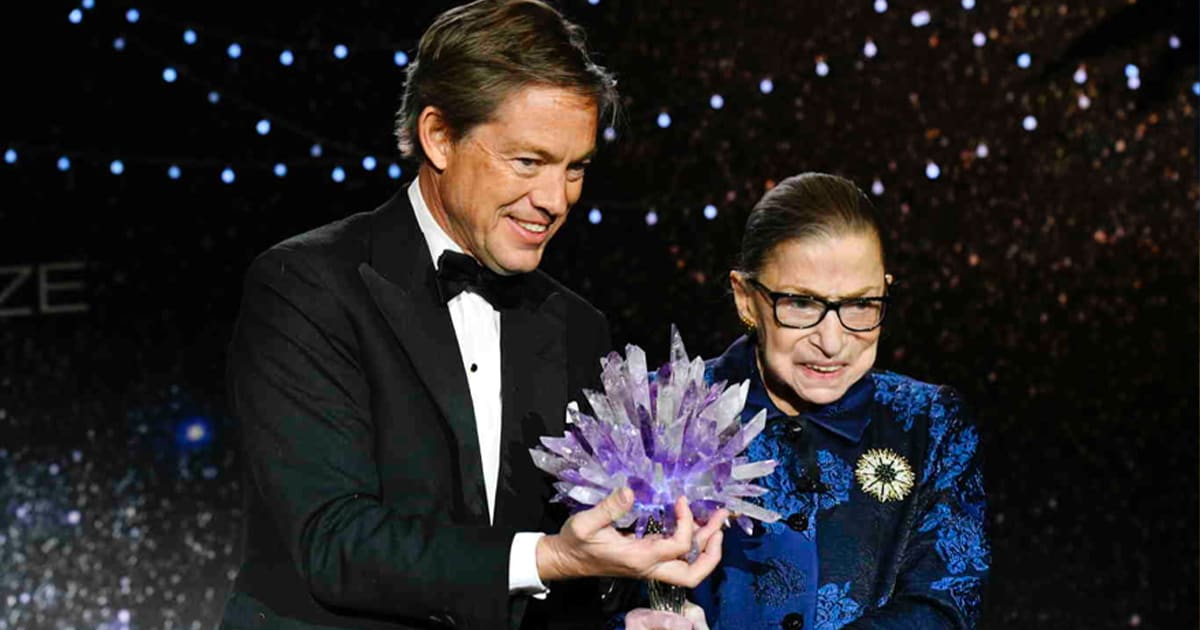Nathan Gardels is the editor-in-chief of Noema Magazine. He is also the co-founder of and a senior adviser to the Berggruen Institute.
The previous two times a president has been impeached, America’s institutions at home and abroad were intact. Today, both are in shambles and facing systemic challenges. This was evident in two major events hosted by the Berggruen Institute in New York this week.
As the U.S. House of Representatives was gearing up to vote on whether to impeach President Donald Trump, the Institute’s Philosophy and Culture Prize was awarded to Supreme Court Justice Ruth Bader Ginsburg at the New York Public Library on Monday night.
In presenting the award, Nicolas Berggruen noted, “You’re not a philosopher in a traditional sense, you are a philosopher in action.” Justice Ginsburg replied: “I’m surely not a philosopher. The text I interpret most often is the U.S. Constitution.”
Ginsburg then tutored the gathering on how the nation’s founding document tasks the House of Representatives with indicting a president who has crossed the bounds of his oath to abide by the rule of law, while the role of the Senate is to try the chief executive just as a judge would sit with impartiality over a trial. Appalled that some senators have already announced their verdict before the trial even opened, Ginsburg said: “The day a judge stops being impartial and starts doing things to please the home crowd, that’s the day that judge steps down.”
To some, this stark reminder by the esteemed justice of the steady erosion of institutional rules and norms taking place on a daily basis in Washington proved that vigor remains in the system of check and balances. To others, it seemed like the last gasp of one of the few remaining sane and stable voices on the national stage as democracy descends into decay.
Also this week, the Berggruen Institute’s 21st Century Council gathered in New York to discuss a presentation by former British Prime Minister Gordon Brown on how to avoid the trajectory we are already on: As the rules-based international order in which all nations have a stake breaks down, the American-led multilateral system that stabilized global relations since the end of World War II is giving way to “one world, two systems,” where there are parallel sets of rules and norms, one for the open societies of the West, the other for authoritarian China and the tributary nations that benefit from its emergence as the preeminent power in the decades ahead.
Brown’s central argument is that the writing is on the wall: by 2050, the center of gravity of the global economy will reverse from where it stood in 2000 when the U.S., Europe, Japan, Canada and Australia dominated 75 percent of global production to 40 percent, with the emerging economies led by China taking the dominant position.
Yet, the present institutions of the American-led post-war order — the United Nations, the International Monetary Fund, the World Bank — remain weighted to the old powers. Unless they are updated to reflect the coming configuration, they will collapse and the new powers will pursue their own course. Indeed, as Brown noted, China has already set up the Asian Infrastructure Investment Bank, the BRICS Development Bank (now the New Development Bank) and is pursuing its Belt and Road Initiative to build infrastructure across Eurasia as “the next stage of globalization.” He does not doubt that an Asian Monetary Fund will soon be in the works.
In the face of this challenge, as Brown and others warned, the U.S. and Europe are more than complacent, but are themselves riven by a new splintering “my country first” nationalism, championed by Trump and others, that disables a collective stance that reflects the open-society values of the West. China pushes forward without resistance.
At the same time, the Council’s Asian and African participants observed, any response by the West to resist this flow of the future must acknowledge that the international system they dominated did not deliver for much of the developing world, as China does. With its emphasis on infrastructure and anti-poverty policies, China’s model offers an upside that a defensive “risk management” approach to salvage the old order just does not.
The further conundrum for the West is that, unlike the challenge of the Soviet Union during the Cold War, our economies are intimately integrated. Given this reality, a blanket decoupling is self-damaging. The best approach is to calibrate any response to China’s rise, for example over the crackdown on Uighurs in western China, on a case-by-case basis.
Fourteen years ago, when China’s rise first became a factor in global relations, then-World Bank President Bob Zoellick called on China to become a “responsible stakeholder” in a rules-based international system that is fair for all instead of yielding to a “law of the jungle” disorder in which the biggest players take all.
Now the tables have turned. If there was any overall consensus in the discussion, it was that the U.S., Europe, Japan and Australia, as its former prime minister, Kevin Rudd, argued, should get their collective act together with a common stance to constructively confront the new reality. It is now up to them to become responsible stakeholders if the values of an open society are to remain a presence in the times ahead.
The U.S. remains the lead player if this hope is to be realized. Both at home and abroad, it is facing a test of its resilience as never before. As with Justice Ginsburg, this historic moment can either be a last gasp or a new beginning in which the vigor of our values once again finds its inner confidence and puts its stamp on a world undergoing profound transformation.




